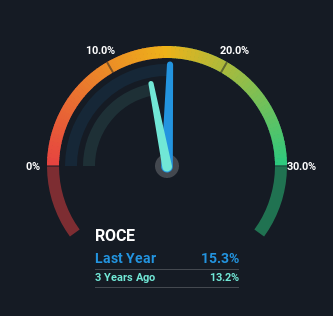Stock Analysis
Here's What's Concerning About Vipshop Holdings' (NYSE:VIPS) Returns On Capital

What trends should we look for it we want to identify stocks that can multiply in value over the long term? In a perfect world, we'd like to see a company investing more capital into its business and ideally the returns earned from that capital are also increasing. Put simply, these types of businesses are compounding machines, meaning they are continually reinvesting their earnings at ever-higher rates of return. Although, when we looked at Vipshop Holdings (NYSE:VIPS), it didn't seem to tick all of these boxes.
Understanding Return On Capital Employed (ROCE)
For those that aren't sure what ROCE is, it measures the amount of pre-tax profits a company can generate from the capital employed in its business. Analysts use this formula to calculate it for Vipshop Holdings:
Return on Capital Employed = Earnings Before Interest and Tax (EBIT) ÷ (Total Assets - Current Liabilities)
0.15 = CN¥5.6b ÷ (CN¥62b - CN¥26b) (Based on the trailing twelve months to December 2021).
Therefore, Vipshop Holdings has an ROCE of 15%. In absolute terms, that's a satisfactory return, but compared to the Online Retail industry average of 12% it's much better.
View our latest analysis for Vipshop Holdings

Above you can see how the current ROCE for Vipshop Holdings compares to its prior returns on capital, but there's only so much you can tell from the past. If you'd like to see what analysts are forecasting going forward, you should check out our free report for Vipshop Holdings.
What The Trend Of ROCE Can Tell Us
On the surface, the trend of ROCE at Vipshop Holdings doesn't inspire confidence. Around five years ago the returns on capital were 25%, but since then they've fallen to 15%. However, given capital employed and revenue have both increased it appears that the business is currently pursuing growth, at the consequence of short term returns. And if the increased capital generates additional returns, the business, and thus shareholders, will benefit in the long run.
On a related note, Vipshop Holdings has decreased its current liabilities to 41% of total assets. So we could link some of this to the decrease in ROCE. What's more, this can reduce some aspects of risk to the business because now the company's suppliers or short-term creditors are funding less of its operations. Since the business is basically funding more of its operations with it's own money, you could argue this has made the business less efficient at generating ROCE. Keep in mind 41% is still pretty high, so those risks are still somewhat prevalent.
The Bottom Line On Vipshop Holdings' ROCE
In summary, despite lower returns in the short term, we're encouraged to see that Vipshop Holdings is reinvesting for growth and has higher sales as a result. These growth trends haven't led to growth returns though, since the stock has fallen 26% over the last five years. As a result, we'd recommend researching this stock further to uncover what other fundamentals of the business can show us.
Like most companies, Vipshop Holdings does come with some risks, and we've found 2 warning signs that you should be aware of.
If you want to search for solid companies with great earnings, check out this free list of companies with good balance sheets and impressive returns on equity.
Valuation is complex, but we're helping make it simple.
Find out whether Vipshop Holdings is potentially over or undervalued by checking out our comprehensive analysis, which includes fair value estimates, risks and warnings, dividends, insider transactions and financial health.
View the Free AnalysisHave feedback on this article? Concerned about the content? Get in touch with us directly. Alternatively, email editorial-team (at) simplywallst.com.
This article by Simply Wall St is general in nature. We provide commentary based on historical data and analyst forecasts only using an unbiased methodology and our articles are not intended to be financial advice. It does not constitute a recommendation to buy or sell any stock, and does not take account of your objectives, or your financial situation. We aim to bring you long-term focused analysis driven by fundamental data. Note that our analysis may not factor in the latest price-sensitive company announcements or qualitative material. Simply Wall St has no position in any stocks mentioned.
About NYSE:VIPS
Vipshop Holdings
Operates online platforms in the People's Republic of China.
Very undervalued with solid track record.

